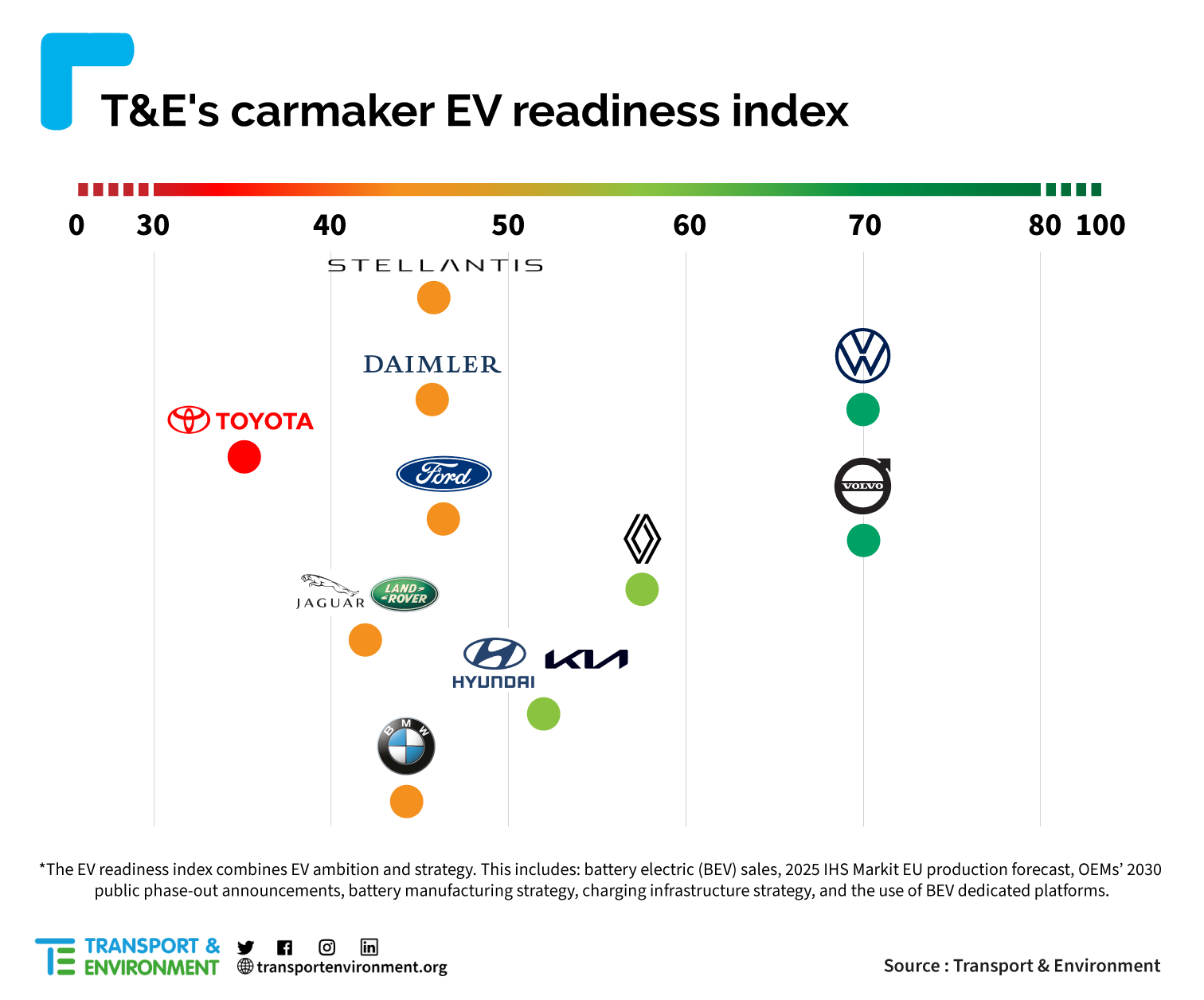Europe’s carmakers are well behind the clock on producing enough electric vehicles to decarbonise by 2050, new analysis by T&E has found. It shows the biggest names are failing to live up to their promises and do not have a plan to get there. T&E says weak car CO2 regulations are putting the EU’s Green Deal at risk and could lead to wasted investments in European battery production.
Requirements for carmakers to reduce CO2 emissions from new cars have forced a move away from petrol and diesel and towards battery electric vehicles. But EU CO2 reduction targets are so lax, most carmakers have little incentive to increase their sales of e-cars until 2030. The Commission is currently working on proposals to strengthen the targets, but they will have to become a lot stricter if road transport is to play its part in achieving the EU’s Green Deal targets.
In Promises but no plans, T&E sets out an analysis of the readiness of 10 major carmakers in Europe to transition to electric. It looks at their current and expected future EV sales, as well as their wider industrial strategies (battery supply chain, dedicated EV platforms, charging infrastructure, etc). It praises Volkswagen and Volvo, but is highly critical of the other eight – some for having no robust plan to put ambitious commitments into action, others for having little to no ambition at all.
Volkswagen has since said that it’s VW brand will stop selling combustion engines by 2035, while its Audi brand has confirmed it will cease production of fossil-fuel cars by 2033.

T&E’s senior director for vehicles and e-mobility Julia Poliscanova said: “Carmakers are desperate to show off their green credentials, but the reality is that most of them are miles away from where they need to be. Even those that are ambitious lack a suitable strategy to get there. Carmakers have failed to deliver on their promises before – who says this time will be different?”
Current targets for reducing CO2 from the average new car require a 37.5% drop by 2030, but this would be easy for most makers to meet. T&E says carmakers’ current ambitions would deliver a 70% CO2 reduction cut, if they make good on their promises.
T&E also warns that failure to set ambitious CO2 reduction targets – and thereby accelerate the production of EVs – would risk wasting the billions of euros that have been invested in Europe’s battery making capacity. In a briefing, it explains how €27 billion has already been spent on making Europe one of the world’s leading centres for producing vehicle batteries, but weak reduction targets are putting the battery boom at risk. Europe stands to produce enough batteries to power over 90% of all new vehicle sales by 2030, yet a lack of ambition on CO2 standards over the next eight years risks well over half the expected output having no market.
Poliscanova added: “The battery industry is successfully responding to Europe’s e-mobility ambitions, yet EU policy-makers are failing to provide regulatory certainty and guarantee a market for electric vehicles. A fossil-fuel-free, all-electric future is possible, but EU and member state decision-makers can’t leave it to carmakers to get there on their own. Targets need to be gradually tightened so the EV revolution can play its full part in tackling climate change.”
Unconfirmed reports say Commission officials are considering a 60% reduction target for 2030, which would be stricter than now but still not sufficient to put the industry on track to phase out combustion engines by 2035. The group has warned that these claims are at present nothing more than speculation. “There is a long way to go until July 14”, concluded Poliscanova.


